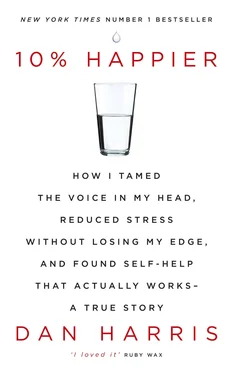I instituted a make-eye-contact-and-smile policy that turned out to be genuinely enjoyable. It was like I was running for mayor. The fact that my days now included long strings of positive interactions made me feel good (not to mention popular). Acknowledging other people’s basic humanity is a remarkably effective way of shooing away the swarm of self-referential thoughts that buzz like gnats around our heads.
At work, I got better at abstaining from gripe and gossip sessions. Complaint is the background noise of news, as well as the secret handshake, like fax machines beeping at one another, or dogs sniffing each other’s rear ends. While I didn’t entirely swear off this kind of chatter—some discussions were too delicious—I did my best to avoid it, knowing that I’d probably want to bathe in Purell afterward.
I would see people losing their tempers—like fellow passengers at the airport going apeshit on TSA employees—and I would empathize. True, I might experience a brief burst of superiority and an urge to recommend meditation to them, but I could also, in the style of Bill Clinton, feel their pain, the toxins running through their veins. The Buddha captured it well when he said that anger, which can be so seductive at first, has “a honeyed tip” but a “poisoned root.”
It’s not that I never got annoyed anymore. In fact, when you’re mindful, you actually feel irritation more keenly. However, once you unburden yourself from the delusion that people are deliberately trying to screw you, it’s easier to stop getting carried away. As the Buddhists liked to point out, everyone wants the same thing—happiness—but we all go about it with varying levels of skill. If you spend a half hour on the cushion every day contending with your own ego, it’s hard not to be more tolerant of others.
I had to swallow hard and admit that perhaps the concept of karma did, in fact, have some validity. Not the stuff about how the decisions we make now play out in future lifetimes. In my emerging understanding, there was nothing mechanistic or metaphysical about karma. Robbing a bank or cheating at Scrabble would not automatically earn you jail time or rebirth as a Gila monster. Rather, it was simply that actions have immediate consequences in your mind—which cannot be fooled. Behave poorly, and whether you’re fully conscious of it or not, your mind contracts. The great blessing—and, frankly, the great inconvenience—of becoming more mindful and compassionate was that I was infinitely more sensitive to the mental ramifications of even the smallest transgressions, from killing a bug to dropping trash on the street.
I recalled how my dad once described undergoing a shift in his professional life where the achievements of his mentees began to mean more to him than his own. I wasn’t quite there yet, but I did feel an increasingly strong urge to provide for younger ABC News staffers the kind of advice and counsel that Peter Jennings and now Diane Sawyer had provided for me. I found that applying the “price of security” maxim by proxy—worrying about other people’s professional challenges—was much more easeful than applying it on myself. It dawned on me that much of what had been driving me since the beginning of my “spiritual” adventure had been a not-quite-fullyconscious desire to live up to my parents and my wife, all three of whom had, for years, been putting on a clinic in metta, even without a formal practice.
Admittedly, there was a large amount of self-interest at play here. Not letting my mind get locked in negativity made space for something else to emerge. I experienced a phenomenon I had heard Joseph once describe: a virtuous cycle, in which lower levels of anger and paranoia helped you make better decisions which, in turn, meant more happiness, and so on.
There were also benefits that might have been a little too selfish for the Dalai Lama’s taste. For example, being nice was a great manipulation tool. Turns out, it’s pretty simple to win people over, especially in tense situations, if you’re able to take their perspective and validate their feelings. And once they like you, they’re much more likely to do you favors. (For example, going into script meetings with a less adversarial stance meant that my coworkers might feel comfortable enough to volunteer ideas that would ultimately make me look smarter on television.) It was weird to hear colleagues refer to me as one of the “easy” correspondents, or make offhand comments about how relatively mellow I was. It was as if my bad old days as an intramural warrior had been erased, as if the anchor who’d been reprimanded for throwing his papers on the news desk in Boston had been forgotten.
I thought it an auspicious sign that not long after I started doing compassion meditation, the pro–basketball player Ron Artest, infamous for jumping into the stands during a game and throwing punches at opposing fans, changed his name to Metta World Peace. (Less auspicious: seven months later, Mr. World Peace was suspended for elbowing an opponent in the head, giving him a concussion.)
My new compassion policy ran into a major challenge in the person of Paris Hilton. This was not the type of assignment that usually came my way, but for reasons I still don’t fully understand, GMA asked me to fly to Los Angeles to interview Hilton about her new reality show and the recent arrest of her stalker. I barely knew anything about her, other than the obvious: the family hotel fortune, the baby voice, the sex tape. So the night before the interview, I turned to my wife—who aside from being a brilliant doctor had a near-encyclopedic memory for anything having to do with pop culture—for guidance. I asked her to do some pro-bono research for me, and she forwarded some articles she found online about the low ratings for Hilton’s new reality show. Some entertainment reporters were openly opining that Hilton was in the twilight of her celebrity, having been eclipsed by her former friend Kim Kardashian. So, I figured: Why not ask her about it? I had an inkling that it could cause some fireworks, but that struck me as a good thing.
The next day, when I arrived at Hilton’s mansion in a gated community built into a hillside, the crew was all set up, Hilton’s assistants were buzzing around, and the star was up in her room, primping. The house seemed barely lived-in, less a home than a product showroom. Nearly every inch of wall space was covered in glossy pictures and oil portraits of Paris. There were even throw pillows that bore her image. I did appreciate that she was an animal lover. The place was crawling with pets—seventeen of them. Out back, there was a doghouse that was a replica of the main house, complete with moldings, a chandelier, furniture, light, heat, and air-conditioning.
Soon enough, Hilton came sauntering in, wearing dressy black shorts and a sheer black top with some elaborate stitching. There was something about her that made me ill at ease. Maybe it was just that I wasn’t used to interviewing celebrities. Maybe it was that she looked right through me. Maybe it was that we kept getting interrupted by various cats skulking into the camera frame.
The interview started well enough. We talked about her TV show and her stalker, as previously agreed upon. I learned that, despite her ditzy persona, she actually ran a genuinely impressive and profitable retail business with stores in thirty-one countries, selling everything from handbags to perfumes. She admitted that when she wasn’t on camera, her voice dropped an octave.
The requisite topics covered, I decided it was time to trot out the tough questions. “Do you worry sometimes,” I asked, “that the people who followed in your footsteps, like Kim Kardashian, are overshadowing you?”
As I posed the question, a look came over her face that said, Where is this going? By the time I’d finished talking, though, and it was time for her to answer, she confidently said, “No, not at all.”
Читать дальше












